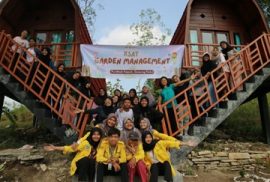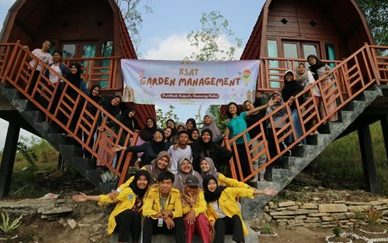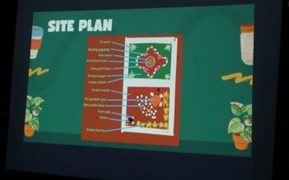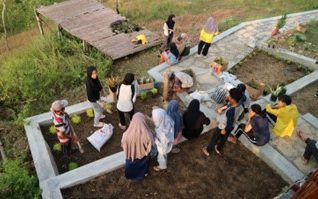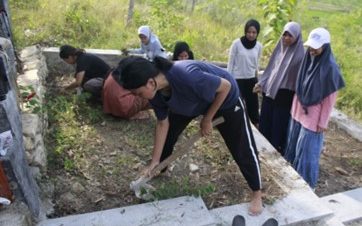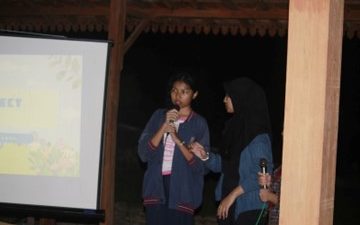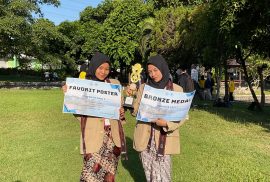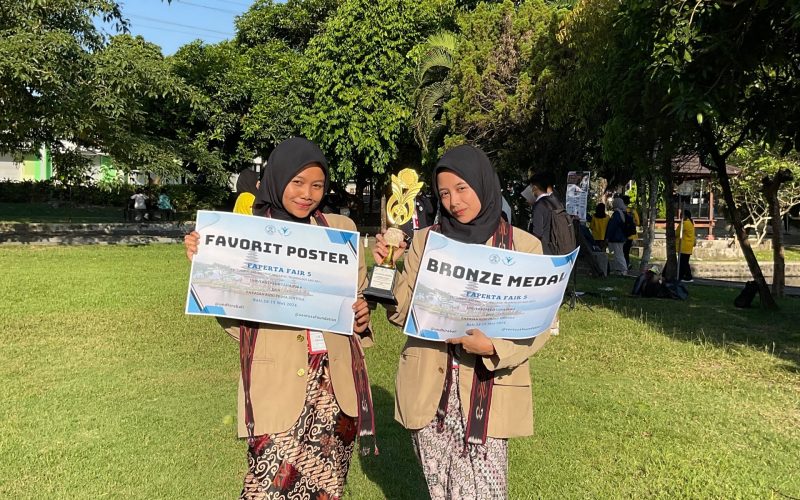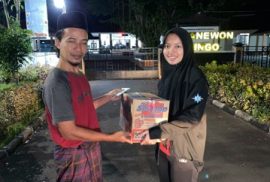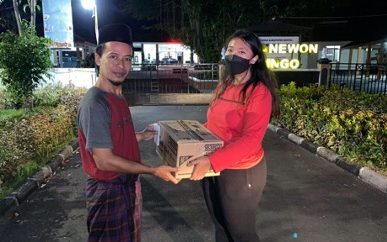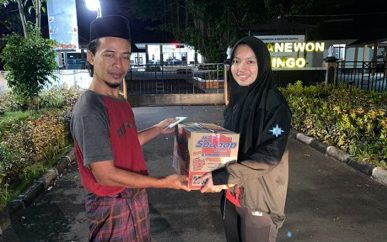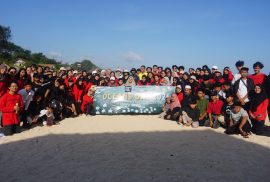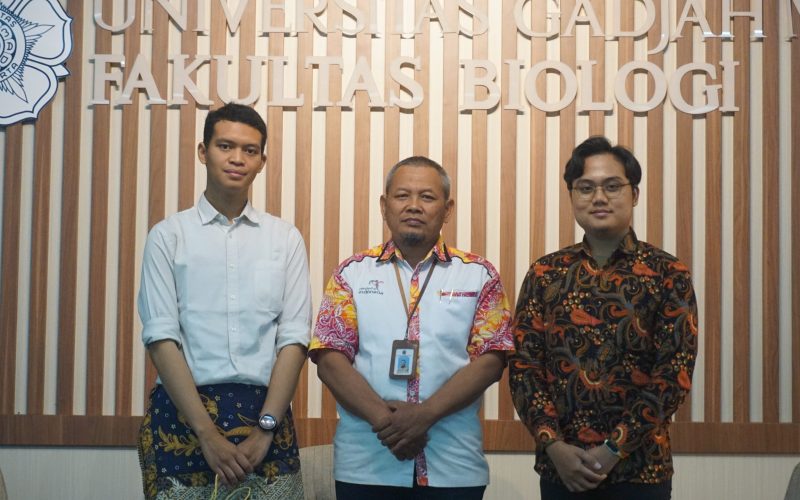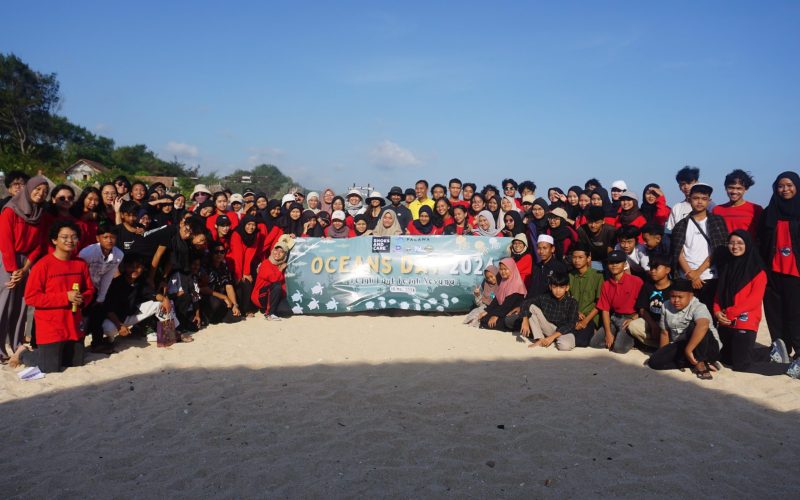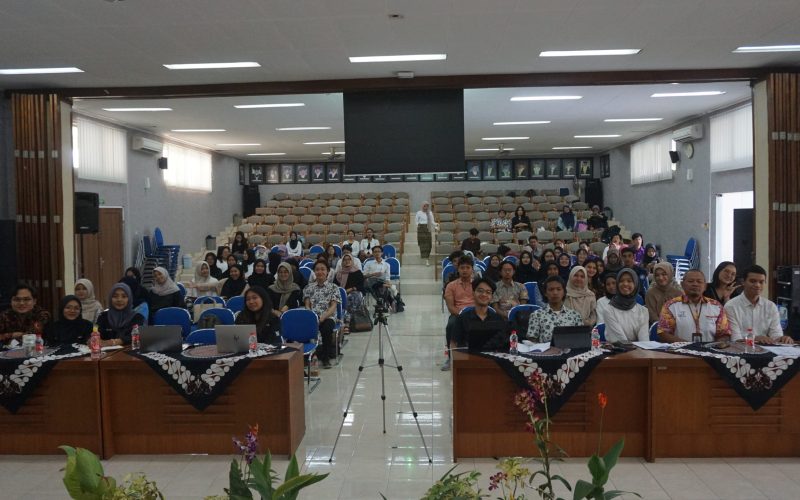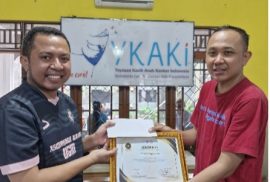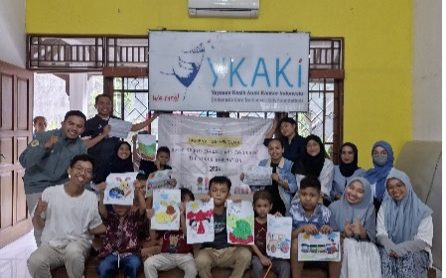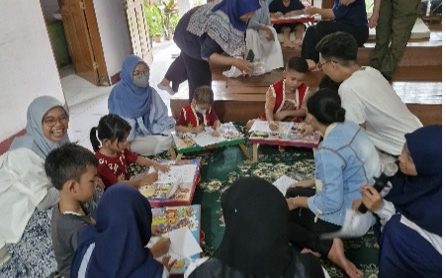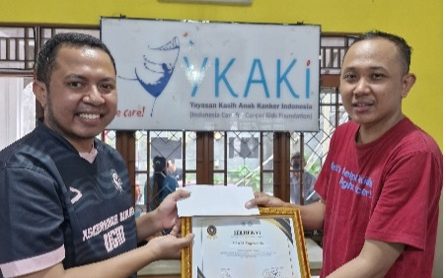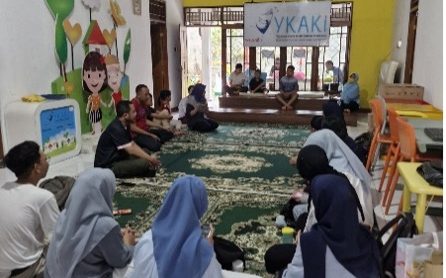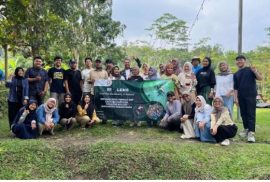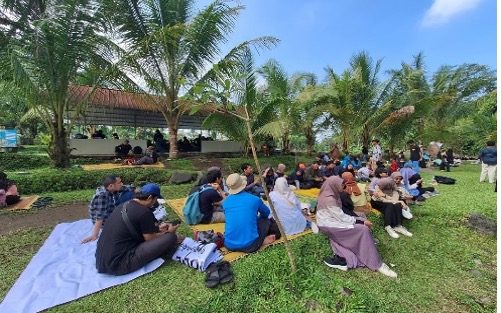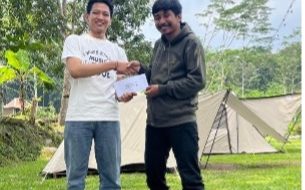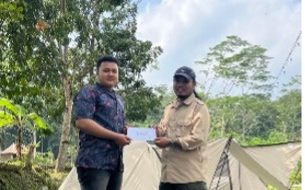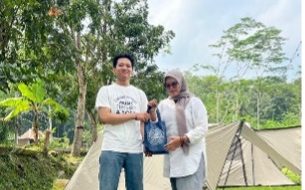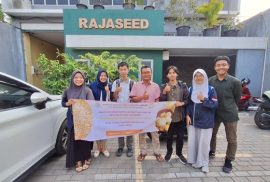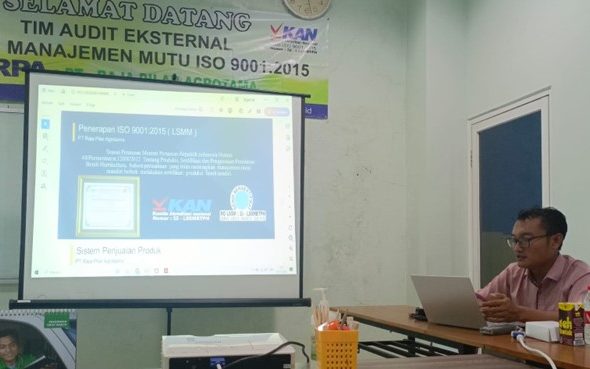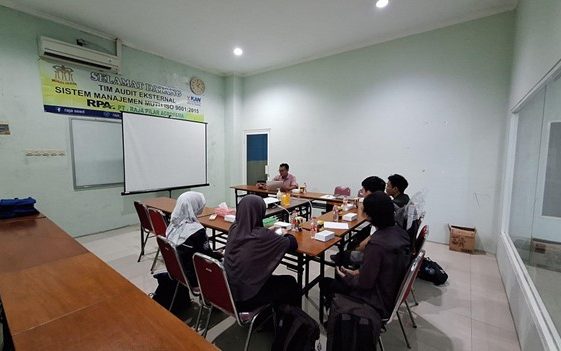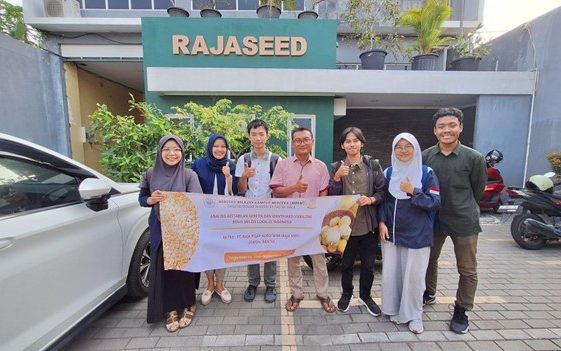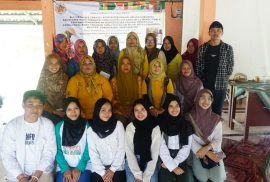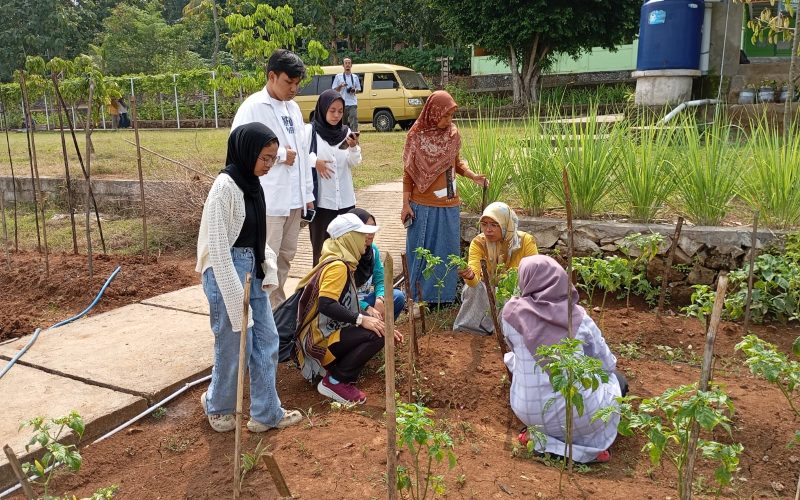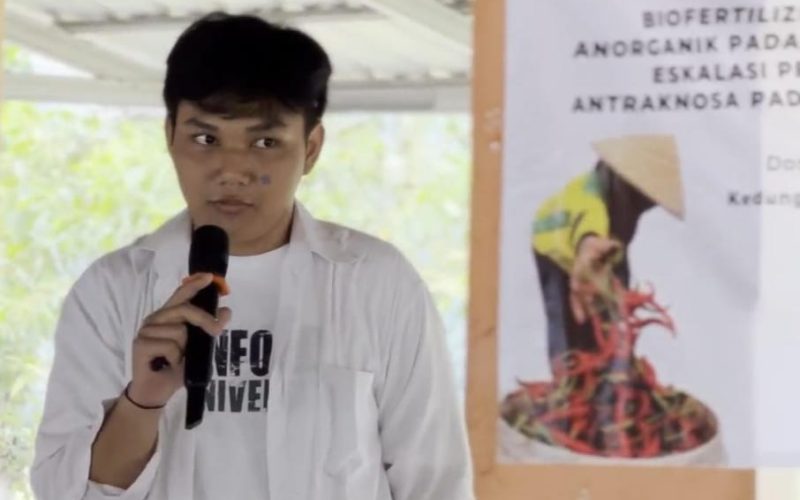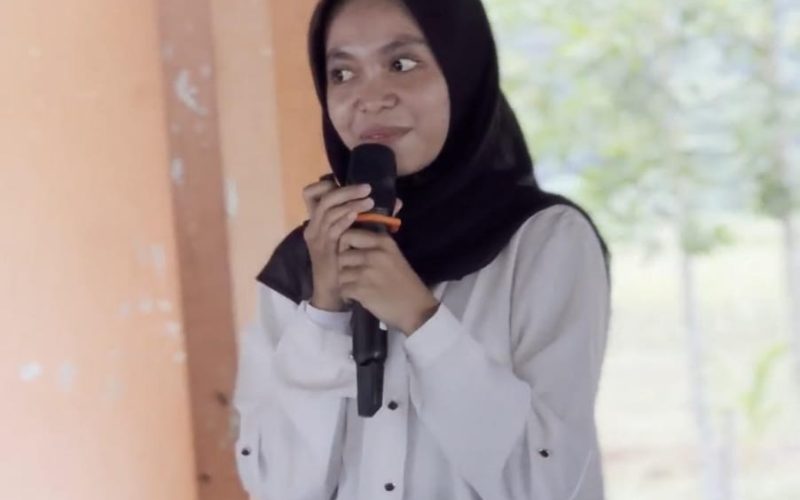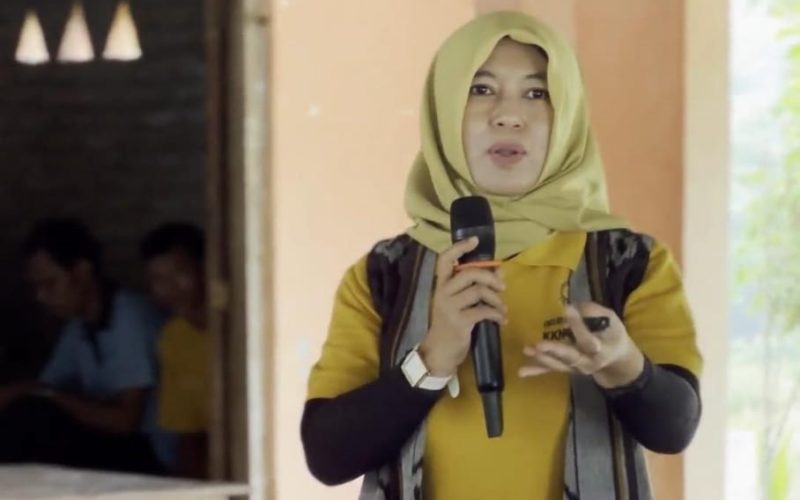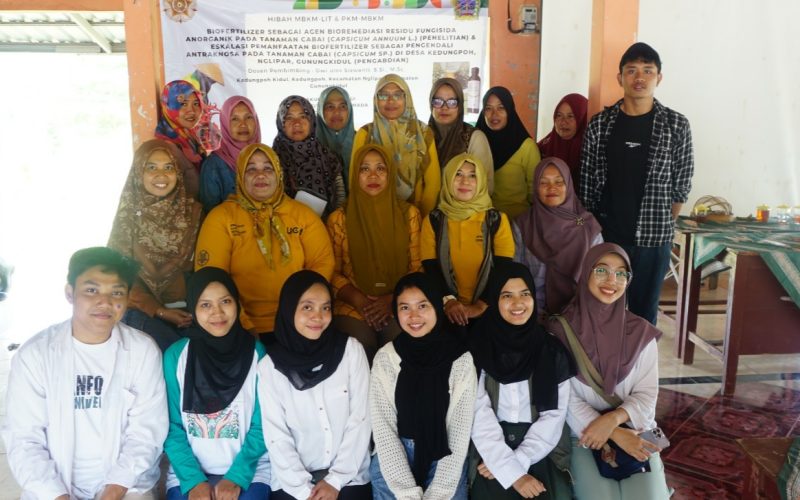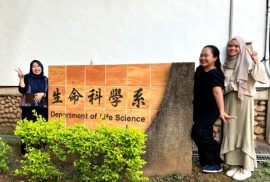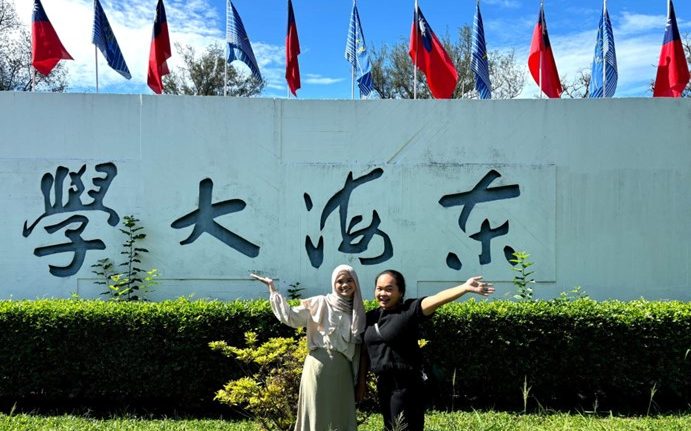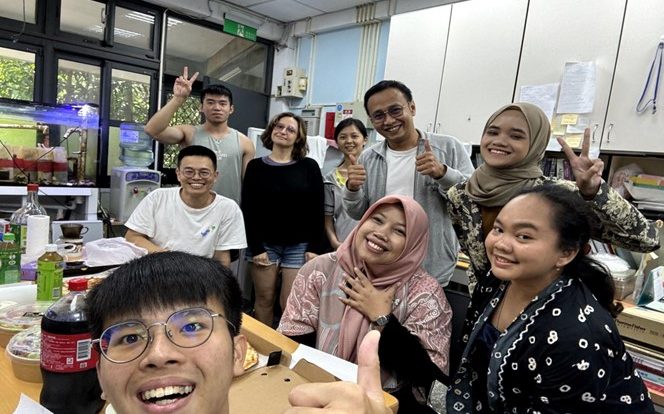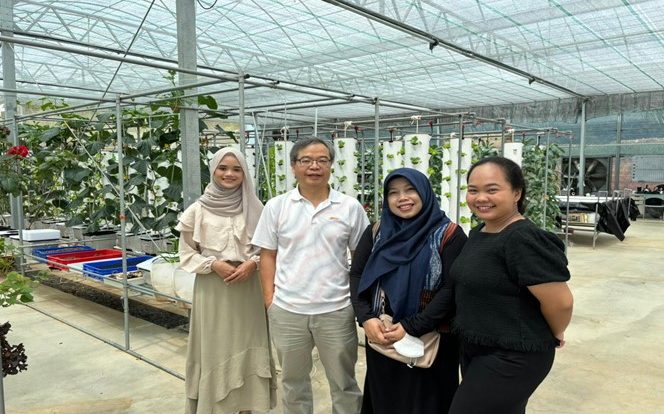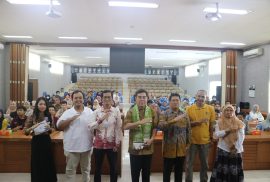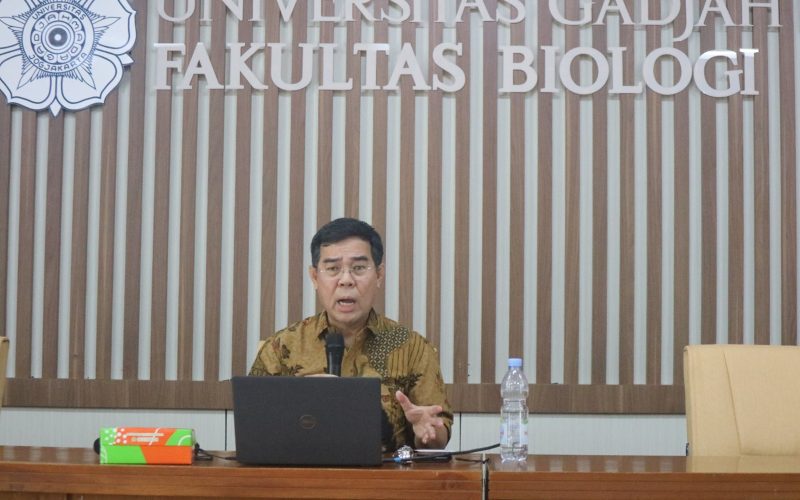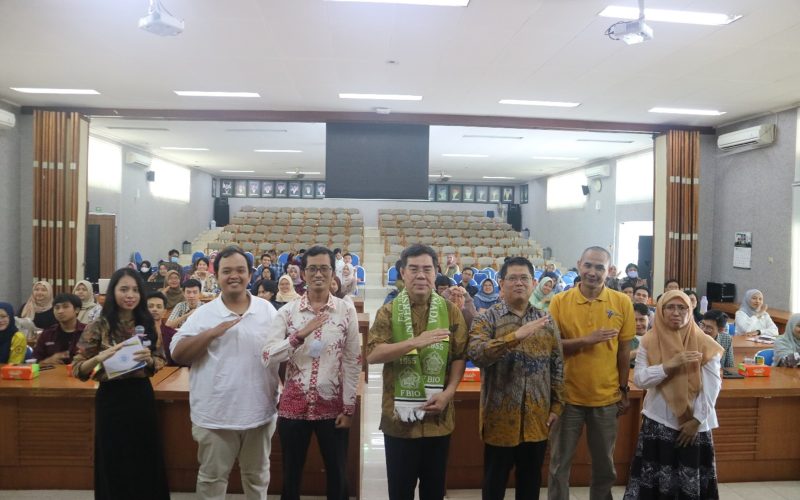On Saturday – Sunday, June 1st – 2nd, 2024, The Garden Architecture Study Group (KSAT) conducted the Garden Management 1 in collaboration with the PkM-MBKM program along with Dr. Wiko Arif Wibowo, S.Si., the supervisor of KSAT. The activity aimed to enhance Seedling’s ability in gardening and took place in Punthuk Kepuh, Gunung Kidul. The main activities were garden design and creation in three designated areas. On the first day, June 1st, 2024, KSAT surveyed the garden areas and had discussions with Punthuk Kepuh management. The next event was a presentation on garden design and an introduction to the types of plants used and their maintenance methods with the community. The second day, June 2nd, was filled with garden creation, tours, and group photos. Each activity was led by Fika Zulfiana (KSAT 2021) and Dyah Ekawati (KSAT 2021) as the MCs.
The Garden Management KSAT 2024 activity ran successfully and on schedule. This activity was carried out as an implementation of knowledge from the material provided during small group discussions. Additionally, this activity also aims to fulfill KSAT’s vision of community service, thus KSAT can become a study group that is beneficial to the broader community.
The issue of pathogens in rice plants is a focus of agricultural empowerment efforts in Indonesia. These pathogens cause disease outbreaks that lead to a decrease in rice productivity. To address this obstacle, some farmers tend to rely on pesticides without noticing the condition of the rice plants. As a result, their efforts were ineffective and posed a threat to environmental health due to chemical pollution from excessive pesticides.
Addressing this issue, Adzkiya Aqmaliza Rahmattillah and Sheva Rimma Dhanty, biology students from the class of 2021, innovated a smartphone-integrated smart scanning application based on Artificial Intelligence called ORYSMART. This application can detect diseases in rice plants and provide treatment recommendations, under the guidance of Dr. Wiko Arif Wibowo, S.Si. ORYSMART was introduced at the FAPERTA FAIR (Futuristic and Prestige Research, Technology, and Art) 5 competition at Dhyana Pura University, Denpasar, Bali, on May 18-19, 2024. In its fifth batch, FAPERTA FAIR carried the theme “The Role of Young Innovators in Facing Global Competition to Welcome Golden Indonesia 2045.” At the event, Adzkiya and Sheva, with ORYSMART, won the Bronze Medal and the Favorite Poster Award in the Technology subtheme as a futuristic innovative solution that can help address diseases in rice plants. With its scanning and recognition capabilities, ORYSMART can detect the type, symptoms, causes, and handling solutions for rice plant diseases. The application offers advanced analysis that combines human and artificial intelligence, providing more accurate disease analysis and effective handling solutions. ORYSMART also facilitates access to consultations with experienced and reliable plant protection experts.
This application aimed to empower rice farmers in Indonesia to manage their fields better and more effectively. Therefore, ORYSMART is designed to be practical and easy to use, especially for users who are not yet familiar with the technology. This innovation is expected to be a significant step in agricultural empowerment in Indonesia, supporting national food security towards Golden Indonesia 2045. This innovation and idea also contribute to achieving SDG 2 (zero hunger) by improving rice productivity, the staple food for most Indonesians. [Author: Sheva Rimma Dhanty]
Oceans Day is an annual event organized by the Marine Study Group (KSK) Faculty of Biology UGM to commemorate World Oceans Day. This year, KSK Biogama had the opportunity to collaborate with Mr. Parvez Alam. Additionally, KSK Biogama invited children from the Al-Khusna Orphanage to join in a beach clean-up, learn about marine life, and recycle trash they collected. During the Oceans Day events, the UGM Marine Study Group held an open donation drive for the Al-Khusna Orphanage. A total of Rp2,015,116.00 was collected.
We are deeply grateful to everyone who participated and supported this cause. On May 18, 2024, following the Oceans Day event at Slili Beach, Gunungkidul, the donations were delivered to the Al-Khusna Orphanage in Gunung Kidul in the form of cash and basic necessities. We believe that this assistance will be very meaningful for the children at the orphanage and will help them in their daily lives. Every contribution, no matter how small, can make a significant difference in the lives of others. [Author: KSK]
On Saturday and Sunday, May 18-19, 2024, the Marine Study Group (KSK) organized a series of events for Oceans Day 2024: Caring for the Ocean, Caring for Each Other. On the first day, May 18, 2024, a beach cleanup activity was held at Slili Beach, Gunungkidul. The event started at 11:05 WIB, followed by remarks from Jagad Wenang Suryoaji (DXXIII), the Chairperson of Oceans Day 2024, and Mr. Parvez Alam, the partner and sponsor. The activities included games, participated by the KSK committee, volunteer participants, children from Al Khusna orphanage, and even Mr. Parvez Alam and his daughter, Lilja Alam. The beach cleanup was conducted following the grouping of participants and location assignments as directed by Slili Beach authorities, along with a briefing on waste separation. This activity continued until 12:05 WIB followed by a break.
After the break, there was a session on education and creation of artworks guided by Alisha Syavitri Ramadhani A (DXXIII) and Muhammad Haidar Ali (DXXIV). Participants were divided into groups and given one hour to create artwork from recycled plastic bottles, followed by a presentation session guided by organizers. Next, an enjoyable activity, capoeira was held at Slili Beach with Mr. Parvez and Lilja. After the games, representatives from Al-Khusna orphanage and volunteers shared their impressions of today’s event. The event concluded with a speech from Mr. Parvez and a group photo.
On Sunday, May 19, 2024, the Marine Study Group (KSK) of the Faculty of Biology, Gadjah Mada University, successfully held the Marine Studies Forum (FKK) titled “Blue Economy as a Response to the Massive Growth of Mass Tourism: Reality or Vision?” The event took place at the Tropical Biology Auditorium, Faculty of Biology, and online via Zoom meeting. This forum aimed to discuss marine issues from various perspectives through sharing and discussion methods, featuring Mr. Supriyanta, S.Sos., M.M. from the Gunungkidul Tourism Office and Dr. Imam Musthafa Zainuddin from the World Wildlife Fund (WWF) as speaker.
The Marine Studies Forum (FKK) hosted by Angga Firza Pratama and Grace River Theofilia Putri Subadi and attended by 65 participants from KSK members, volunteers, and external parties from the Faculty of Biology and beyond UGM. The forum began with opening remarks by the MC, followed by singing the Indonesian national anthem, the Gadjah Mada University hymn, and the KSK anthem. The event was preceded with speeches from Muhammad Ariq Alfito, Chairman of KSK Biogama, and Jagad Wenang Suryoaji, the event chairman. Next, an introductory video on the Blue Economy and Mass Tourism shown, followed by an initial discussion between the MC and the speakers.
Proceeding to the main event, the first interview shown, focusing on tourism in Gunungkidul, followed by a discussion with the speakers and Koor KK. Next, a second interview video on marine biota was shown, leading to a discussion with the speakers, Koor KK, and external parties. Following the discussion, there was a presentation and Q&A session with Mr. Supriyanta, S.Sos., M.M. from the Gunungkidul Tourism Office, and a token of appreciation was given to the first speaker. The event continued with a presentation and Q&A session with Dr. Imam Musthafa Zainuddin from the World Wildlife Fund (WWF), and tokens of appreciation were given to the speakers at the end of the session. The Marine Study Forum concluded with a session for impressions and messages, followed by closing remarks and a summary. [Author: KSK]
On Sunday, June 2, 2024, The Social Community Division (SOSMAR) of the Graduate Student Association (KMP) conducted the ‘KMP Teaching,’ an annual activity held twice a year at different institutions. The activity took place at YKAKI located at Jl. Timor Tim. No.9, Purwosari, Sinduadi, Mlati District, Sleman Regency, Special Region of Yogyakarta, with the theme “Build Spirit: Educate and Encourage the Young Generation.” The activity aimed to demonstrate the KMP’s concern for children with cancer. This year, the SOSMAR Division collaborated with the Spiritual Division to implement the “KMP Teaching” program. This activity was attended by 10 KMP members and 15 children from YKAKI.
The activity began with an opening led by Puji Lestari, S.Pd., as the Master of Ceremony (MC), followed by speeches and gratitude from the event organizers to the leaders and mentors of YKAKI. The activity proceeded with coloring sessions, followed by a 30-minute session of educational animation viewing. Before the Quran recitation session, there was singing, applause, and awarding for the best colorings. The Quran recitation was conducted by Safril, S.Si., the head of the Spiritual Division.The event concluded with group photos, certificate presentations, and a donation to the head of Yayasan Kasih Anak Kanker Indonesia as a gesture of concern and support for children with cancer.
It is hoped that such activities will enhance the children’s learning spirit and motivation at YKAKI Yogyakarta. The program aims to continue with more inspiring and engaging activities in the future.
On Saturday, June 2, 2024, the Interest and Talent Development Division of the Graduate Student Association (KMP) Faculty of Biology Universitas Gadjah Mada (UGM) organized the BioLens event. The event aimed to foster graduate student interests and talents in photography, as training in photography for research purposes, and to introduce campus facilities that support research. The event took place at Ledok Sambi Kaliurang, Yogyakarta, with the theme “Capture The Beauty of Nature.”
The event consisted of two sessions: a material session and a photo-hunting session and was opened by Nadhifa Ummulhusna Dyah Wikantyasti, S.Si., and Ananda Putri Gita Natasya, S.Pd., as the MC. The material session was delivered by Rizal Muhammad Rifa’i, S.Pd, covering tools in photography, photography techniques, and photo editing, followed by a Q&A session, where participants asked about general photography challenges and steps on photography for research purposes.
The event continued with a photo-hunting session around the Ledok Sambi Kaliurang. Then, the photos uploaded to the prepared Google Drive for the judging session. During the judging session, the judges struggled to determine the winners. After intense discussion, the winners of the three best photos were announced: 1) Alfian Surya Fathoni, S. Pd., 2) Wahyul Fatwatul Umam AS, S.Si., and 3) Arfika Racmadianira, S.Si. The BioLens event concluded with awarding certificates and souvenirs to the speakers, prizes for the three best photos, and a group photo. [Writer: KMP]
[MBKM] – Yogyakarta, May 29, 2024 – The Independent Learning Independent Campus (MBKM) Research Team Faculty of Biology 2024, led by Prof. Dr. Budi Setiadi Daryono, M.Agr. Sc., titled “Genetic Stability Analysis and Viability Identification of Indonesian Local Melon Seeds,”visited PT. Raja Pilar Agrotama, also known as Rajaseed. The visit was attended by Maximus Jonathan Salim, Rafferty Reyhan, Laksita Chesarina, Haris Dwi Nugroho, and Ihsanti Tsania Fajriati, along with their supervisor, Dian Sartika, M.Sc. The visit aimed to provide the MBKM research team insights into seed production procedures and quality control (QC) at PT. Raja Pilar Agrotama.
The session began with introductions and a welcome from Mr. Warsito Nurtiyasno, Head of Research and Development and representative of PT. Raja Pilar Agrotama. He explained the company profile of PT. Raja Pilar Agrotama. Next, he provided fundamental education on seed production and QC. He emphasized the importance of partnerships between seed producers and farmers to ensure sustainable production. Mr. Warsito explained that viable seeds must undergo a series of processes, such as extraction, cleaning, moisture reduction, sorting, and storage. He highlighted key quality parameters such as seed moisture content, purity percentage, and germination capacity. A lively question and answer session covered seed identification methods and optimal environmental conditions for seed storage. The session concluded with documentation.
This visit is expected to equip the MBKM Research Team with valuable knowledge and enhance collaboration with PT. Raja Pilar Agrotama. Moreover, the MBKM Research activities contribute to achieving IKU 2 (Off-Campus MBKM) for the Faculty of Biology UGM and support the Sustainable Development Goals (SDGs), including goals such as No Poverty, Zero Hunger, Quality Education, Industry, Innovation, and Infrastructure, and Partnership for the Goals.
[MBKM] On Thursday, May 23, 2024, The MBKM Research and Community Service Team “BIOFERMED (Biofertilizer and Bioremediation)” conducted a program socialization on the utilization of biofertilizer for controlling anthracnose and remediating fungicide residues in chili plants at Lumbung Mataraman, Kedungpoh, Gunungkidul. The Biofermed team consists of Fharsya Febrildha, Rindha Amarsita, Siti Muyassaroh, Ronald Wihan Pradana, and Tiffa Kusuma Dewi, under the guidance of Dwi Umi Siswanti, S.Si., M.Sc. This program was the continuation of the Independent Learning Independent Campus (MBKM) program in 2021, 2022, and 2023 in Kedungpoh Village, Nglipar, Gunungkidul.
The community service program focuses on expanding the use of biofertilizers for controlling anthracnose in chili plants in the paddy fields and greenhouse of Lumbung Mataraman. The program was motivated by the anthracnose disease affecting chili plants at Lumbung Mataraman and the lack of organic control solutions. The MBKM research program emphasizes the use of biofertilizer as a remediation agent for inorganic fungicide residues in chili plants at Lumbung Mataraman. Research on fungicide residue bioremediation is driven by the extensive use of inorganic fungicides from various brands in Lumbung Mataraman, impacting harvest safety.
The socialization began with a program plan presentation by Dwi Umi Siswanti, S.Si., M.Sc., which includes training on producing biofertilizers from cow urine and its application. ‘’Biofertilizers from cow urine containing various microbial species, expected to effectively and efficiently control anthracnose in Lumbung Mataraman and reduce inorganic fungicide residues that have been used,” said Dwi during the presentation. The program partners include ten groups of the Women Farmers Group of Kedungpoh and the managers of Lumbung Mataraman. The partners were enthusiastic about the programs presented by the team. “We have been eagerly awaiting programs from the Faculty of Biology,” said the Kedungpoh village head on behalf of the partners.
Didik Purnomo, Director of Lumbung Mataraman, mentioned that the Biofermed team would support the Women Farmers Group (KWT) from ten hamlets coordinated by Tri Wahyuni. The Women Farmers Group of Kedungpoh eagerly anticipated collaboration with the Biofermed team, the group already prepared for chili cultivation. “We are ready to plant chili using Bu Wawien’s biofertilizer formula and await further guidance,” said Tri Wahyuni, one of the agricultural leaders in Kedungpoh recognized as the Woman Initiator in Agriculture 2024 for Gunungkidul Regency.
This activity aligns with SDGs numbers 3 (Good Health and Well-being), 12 (Responsible Consumption and Production), 15 (Life on Land), and partnerships to achieve goal 17.
From May 30 to June 1, 2024, a team from the Faculty of Biology at Universitas Gadjah Mada had the opportunity to visit the Department of Life Science and the Department of Chemical and Materials Engineering at Tunghai University. This visit was represented by one of the Faculty of Biology lecturers, Ganies Riza Aristya, S.Si., M.Sc., Ph.D., accompanied by two Fasttrack Master’s by Research students, Azizah Tyas Nugrahanty, S.Si., and Lucia Arum Sekar Meysari, S.Si.
A warm welcome was extended by Professor Shao-Lun Liu and the researchers at the Department of Life Science. A sharing session was held to exchange experiences and knowledge about the latest advancements in phylogenetic analysis of plants, and there was an opportunity to learn about the prospects of studying at Tunghai University. We were also given the chance to have a discussion session with Professor Li-Wei Wu about the diversity of butterflies in the world, particularly in Taiwan.
Additionally, the team had the opportunity to visit the Net Zero Emission area at Tunghai University, a futuristic project developed to support environmental sustainability. One of the main initiators of this project is Professor Hong-Wei Yen, who is currently developing research on the potential of microalgae in the industrial world. During the visit, Professor Yen explained the idea of utilizing biomass from microalgae as an innovative solution to support sustainable and environmentally friendly fish and hydroponic vegetable farming.
This program demonstrates the Faculty of Biology’s commitment to supporting Universitas Gadjah Mada’s efforts to strengthen its ranking in distinguished scientific fields, contributing to science and humanity. This goal aligns with SDG number 8 on education. Furthermore, this visit represents one of the implementations of the Tri Dharma of Universitas Gadjah Mada. It is expected that this visit will expand Universitas Gadjah Mada’s international collaborations with other renowned universities. We extend our gratitude to Professor Shao-Lun Liu, Professor Hong-Wei Yen, Professor Li-Wei Wu, and all the staff of Tunghai University for warmly welcoming us and providing very interesting knowledge and information.
#SDGs
#TridharmaUniversitasGadjahMada
#InternationalCollaboration
Yogyakarta, 1 June 2024 – The Faculty of Biology, Universitas Gadjah Mada held a Stadium Generale entitled The Role of Research in the Development of the Palm Oil Industry. The public lecture which was held in the Tropical Biology Auditorium, Faculty of Biology UGM, was attended by lecturers and students, with speaker Dr. Tony Liwang, member of Research and Development Committee of the Palm Oil Plantation Fund Management Agency (BPDP KS).
“Indonesia is the largest palm oil producer in the world, and we as researchers are expected to be able to contribute to the development of research and applications for managing these plantation products,” said Prof. Dr. Budi Setiadi Daryono, M.Agr.Sc. as Dean of the Faculty of Biology UGM in his speech on Saturday (1/6). He added that research contributions and applications need to be continued, especially to support economic improvement and community welfare.
The public lecture was then guided by Tia Efriansi, S.Si, one of the students in the Faculty of Biology UGM doctoral study program. Tia gave an overview of how the palm oil industry in Indonesia has developed to date and its potential, before then introducing lecture speakers from the Research and Development Committee of the Palm Oil Plantation Fund Management Agency (BPDP KS), Dr. Tony Liwang.
Dr. Tony Liwang is a member of the Research and Development Committee of the Palm Oil Plantation Fund Management Agency (BPDP KS). He is the inventor of 12 varieties of oil palm, including cloned plants resulting from oil palm tissue culture with high productivity, as well as the discoverer of more than 300 genes that have been registered in GeneBank. There are at least 14 patents under Dr. Tony’s name which has been applied on a commercial scale.
“Palm oil is the largest oil and gas foreign exchange contributor in Indonesia,” said Dr. Tony in his presentation Saturday (1/6). He emphasized the huge potential of palm oil produced by Indonesia every year, and the potential for post-harvest waste management research which is still being developed.
Palm oil itself is a component that is often found in everyday life, through food products or food derivatives produced by various multinational companies. These include cooking oil, margarine, milk, vitamins and supplements, and even soap.
The Palm Oil Plantation Fund Management Agency (BPDP KS) plays a role in managing funds for the development of sustainable palm oil research in Indonesia. Dr. Tony gave a presentation on several potential research that had been supported by BPDP KS, including innovations in the production of ligninolytic enzymes, CMC edible mushrooms, and organic fertilizer from empty oil palm fruit bunches (TKKS), bioplastic production technology from empty oil palm fruit bunches (TKKS), production of calcium soap from palm oil fat (PFAD) to increase cow’s milk production, production of MDAG (emulsifier) from palm oil, production of printing ink (green varnish) from palm oil derivatives, production of thread and fabric from empty palm fruit bunch fiber (TKKS), production of biochar (propolis charcoal), and so on.
“The challenge of research development is that it often stops at the initial research stage and is difficult to reach the commercialization stage,” said Dr. Tony is next. He said that the biggest problem was in the process of scaling up research results to the industrial level. In this case, BPDP KS plays a role in bridging palm oil research and development to produce products and technology up to the commercialization stage.
The public lecture was continued with a question-and-answer session between participants and resource persons. Participants were very enthusiastic throughout the lecture and it is hoped that through the lecture presentation they can stimulate innovative and applicable ideas, especially in supporting the development of palm oil research, as well as indirectly participating in economic growth and prosperity in Indonesia.
SDGS point tags: SDG 4, 8, 9, 12, 17

